Mechanism for recycling tRNAs on stalled ribosomes

Abstract
Aberrantly stalled ribosomes initiate the ribosome-associated quality control (RQC) and mRNA surveillance pathways for the degradation of potentially toxic peptides and faulty mRNAs. During RQC, ANKZF1 (yeast Vms1p) releases ubiquitinated nascent proteins from 60S ribosomal subunits for proteasomal degradation. Here, we use a cell-free system to show that ANKZF1 and Vms1p sever polypeptidyl-tRNAs on RQC complexes by precisely cleaving off the terminal 3'CCA nucleotides universal to all tRNAs. This produces a tRNA fragment that cannot be aminoacylated until its 3'CCA end is restored. The recycling of ANKZF1-cleaved tRNAs is intact in the mammalian cytosol via a two-step process that requires the removal of a 2',3'-cyclic phosphate and TRNT1, the sole CCA-adding enzyme that mediates tRNA biogenesis in eukaryotes. TRNT1 also discriminates between properly folded tRNA substrates and aberrant tRNA substrates, selectively tagging the latter for degradation. Thus, ANKZF1 liberates peptidyl-tRNAs from stalled ribosomes such that the tRNA is checked in an obligate way for integrity before reentry into the translation cycle.
